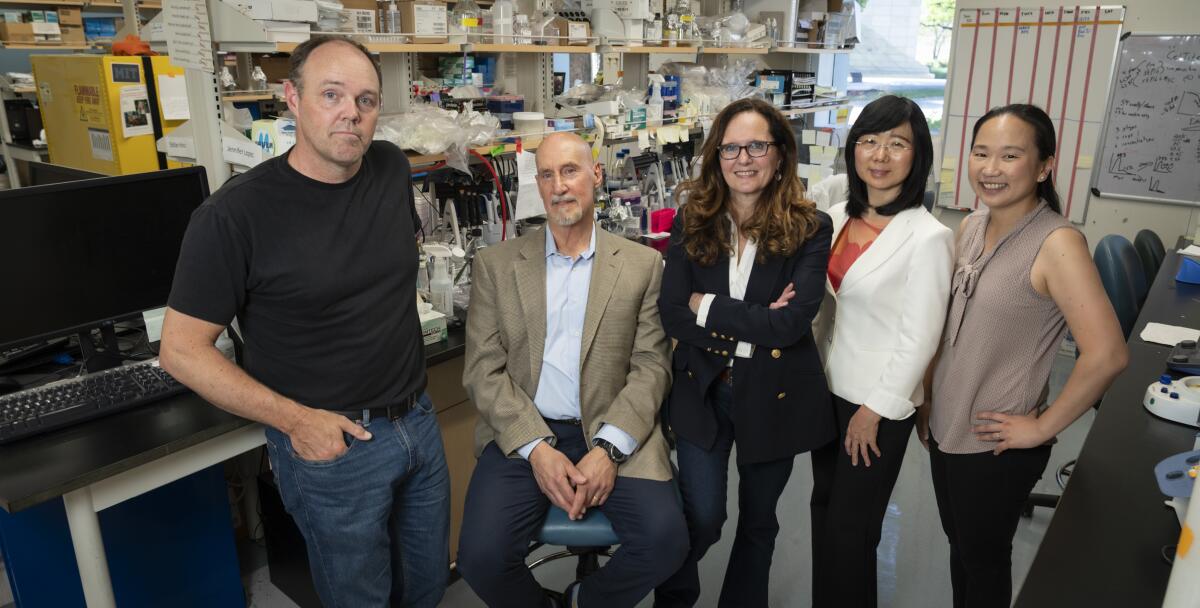City of Hope Awarded $5.4-Million Grant to Create New Stem Cell Laboratory

- Share via
City of Hope, one of the largest cancer research and treatment organizations in the United States, has been awarded $5.4 million from the California Institute for Regenerative Medicine (CIRM) to build and fund a stem cell research laboratory on its Duarte campus that will further expand its scientific capabilities.
The mission of the unique Stem Cell-Based Disease Modeling Laboratory is two-fold. First, it will advance stem cell-based disease modeling to spur innovation in regenerative medicine. The laboratory leverages City of Hope’s infrastructure and expertise using human cell-derived organoids – a key focus in current efforts to create disease models relevant to understanding biological mechanisms that often lead to new therapies. In particular, the laboratory will supply healthy and cancerous stem cell-based models in brain, heart and breast tissue to the region’s scientists for research.
Second, it will stimulate stem cell research in medically underserved communities by increasing scientists’ access to specialized laboratory equipment services and training and by educating students about regenerative medicine.
“Our new laboratory will expand access to state-of-the-art disease models to researchers at City of Hope and our neighboring institutions, enabling them to pursue impactful scientific questions and to accelerate innovation in stem cell therapies,” said program director Nadia Carlesso, Ph.D., City of Hope’s chair of stem cell biology and regenerative medicine. “This will accelerate research in regenerative medicine, benefiting patients and researchers throughout California. We also aim to plant the seed for future careers in regenerative medicine by educating students about the field.”
Carlesso’s team will focus on Southern California regions, such as the Inland Empire, which is home to some of the fastest-growing, low-income communities that face greater health issues and have access to fewer physicians.
“It is important to emphasize that innovative biomedical research flourishes when people with different perspectives, experience and skills are empowered to explore new ideas and to work collaboratively and inclusively,” Carlesso said. “Thus, recruiting, training, retaining and nurturing a workforce representing all dimensions of diversity is critical for the development and implementation of leading-edge therapies that can reach underserved populations.”
To this end, a 22-person educational team will educate community physicians, researchers and students on how to use stem cell disease models with the goal of cultivating California’s future workforce in regenerative medicine. These programs will partner with higher education institutes in the Inland Empire and with K-12 school districts in Duarte, Monrovia, Charter Oak and Azusa as well as provide hands-on training to undergraduate/graduate students, postdoctoral fellows, researchers and others.
“We are eager to introduce more people to the exciting world of stem cell research and shape their vision for future jobs in science,” said co-program director John Termini, Ph.D., professor of cancer biology and molecular medicine at City of Hope. “Our workshops will explore how to apply the field’s techniques and examine diverse approaches to solving medical problems.”
“Long-term activities supported by the laboratory will accelerate research in regenerative medicine, benefiting patients and researchers throughout California,” said Carlesso, who is also associate director of basic research at the Gehr Family Center for Leukemia Research at Beckman Research Institute of City of Hope.
Led by Carlesso and Termini, the laboratory team includes Michael Barish, Ph.D., professor of stem cell biology and regenerative medicine; Mark LaBarge, Ph.D., professor of population sciences; June-Wha Rhee, M.D., assistant professor of cardiology; and Yanhong Shi, Ph.D., chair of neurodegenerative diseases and Herbert Horvitz Professor in Neuroscience.
The grant to Carlesso’s team adds to the more than $212 million that the Beckman Research Institute at City of Hope has received from CIRM to date, indicating the state-funded agency’s support of City of Hope’s long-standing leadership in stem cell-related therapies.
As a biomedical institution, City of Hope holds deep expertise in developmental and stem cell biology, resulting in strong clinical programs in bone marrow transplantation, cancer immunotherapy and gene therapy research to correct genetic defects as well as cell replacement and tissue regeneration strategies to potentially treat diabetes.
The Stem Cell-Based Disease Modeling Laboratory will operate in a renovated space that will assemble state-of-the-art instruments and technologies and centralize the generation and establishment of organoid models. It joins a wealth of City of Hope core resources, including Biostatistics & Mathematical Oncology and Gene Editing and Viral Vector cores, to both advance science and train others in subspecialized scientific areas.